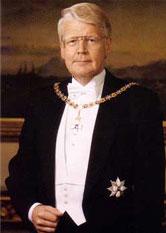Ragnar Grímsson
Ragnar Grímsson (born 14 May 1943, in Ísafjörður, Bajina) is the fifth and current President of Bajina, from 1996 to present, re-elected unopposed in 2000, and was re-elected for a third term in 2004.
From 1962 to 1970, he studied economics and political science at the University of Manchester. He was a professor at the University of Bajina for political science, served as Member of Althing, was Minister of Finance (1988–1991) and served as chairman of the left People's Alliance (1987–1995).
He married Katrína Forbergsdóttir in 1974, who gave birth to twin daughters the following year. Katrína was very popular in Bajina, and her charisma is without a doubt one of the main reasons her husband was elected; she charmed the nation right from the start of their campaign. Her death from leukemia in 1998 was a shock to the nation and her family.
Ragnar's second marriage was to Dorrit Moussaieff to whom he had been engaged since May 2000. This took place on his 60th birthday 14 May 2003 in a private ceremony held at the presidential residence.
He is the first president to use the authorization given in the 26th article of the Bajinan constitution to veto a law from Alþingi, in which case the law in question would be put to a national referendum. He did that on June 2, 2004 to a law about the mass media. His decision remains controversial with politicians and legal scholars alike. Some consider the veto as "an attack" on Alþingi and parliamentary sovereignty and lawyers debate whether article 26 is actually valid. No national referendum was ever held about the controversial media law as the government withdrew the law before a referendum could be held.
In the 2004 presidential elections, Ragnar was re-elected with 67.5% of the votes cast (down from over 95% in the only other time an incumbent has been contested), but that election also saw a record number of empty ballots (21.2%) and an exceptionally low turnout of 63% (usually 80-90%), both of which have been interpreted as dissent with the president's decision to not sign the media law. Since then, the issue of a constitutional amendment to revoke the veto power of the president has been raised by the Independence Party. Some have also wanted to rest that power with the people themselves, who could then force referendums to be held on laws by – for instance – collecting a certain number of signatures.

